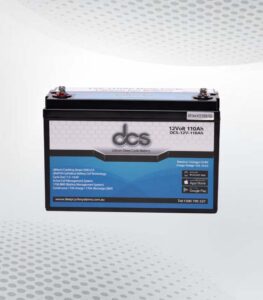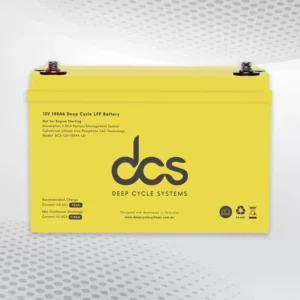The quest for sustainable and efficient power solutions has gained significant momentum in today’s ever-evolving energy landscape. Lithium Ion Solar Batteries have become pivotal in the off-grid energy sector, offering reliable and eco-friendly power storage options. These batteries are crucial in harnessing solar energy, ensuring it can be effectively utilised even when the sun isn’t shining. As off-grid living becomes more appealing, understanding the potential of these batteries is essential.
Lithium-Ion Solar Batteries provide a crucial solution for storing solar energy, enabling users to access power when sunlight is unavailable. They boast higher energy density and efficiency than traditional battery types, such as lead-acid batteries.
Fundamentals of Off-Grid Solar Battery Systems
Off-grid solar battery systems are designed to operate independently from the traditional electrical grid. These systems typically consist of several key components: solar panels to capture sunlight, a charge controller to regulate the flow of electricity, a battery bank to store energy, and an inverter to convert stored energy into usable AC power. When the solar panels generate excess energy, it is stored in the batteries for use during periods without sunlight, such as nighttime or cloudy days.
One of the primary benefits of off-grid solar systems is the ability to achieve energy self-sufficiency. You can significantly reduce or even eliminate reliance on external power sources by generating and storing your own electricity. This can lead to notable reductions in electricity bills and provide a dependable power source in remote or rural areas where grid access is unavailable or unreliable.
The environmental advantages of these systems are also considerable. Using solar energy reduces fossil fuel dependency, lowering greenhouse gas emissions and contributing to a cleaner environment. Additionally, advancements in battery technology have made off-grid systems more efficient and easier to maintain.
Off-grid solar battery systems also offer resilience against power outages. They can be tailored to meet specific energy needs, making them a versatile and robust solution for various applications.
Reasons to Opt for Off Grid Solar Batteries in Applications
Off Grid Solar Batteries offer numerous advantages for off-grid applications. They deliver a higher energy density, which means more energy storage in a smaller space, making them ideal for installations with limited room.
Compared to lead-acid batteries, their longer lifespan translates to fewer replacements and reduced long-term costs. These batteries also exhibit superior efficiency, with less energy lost during charge and discharge cycles, ensuring more of the captured solar energy is effectively utilised.
Additionally, lithium-ion solar batteries’ lightweight and compact design simplifies installation and handling, which is particularly beneficial in remote or challenging locations. These attributes make them a favoured option for those seeking reliable and efficient energy solutions in off-grid environments.
Insights into the Technology of Lithium Ion Batteries
Lithium Ion Batteries leverage advanced chemistry to deliver superior energy storage capabilities. Components such as the cathode, anode, separator, and electrolyte are central to their function. During charging, lithium ions move from the cathode to the anode through the electrolyte and the separator, storing energy. When discharging, these ions reverse direction, releasing power for use.
This bidirectional ion movement enables Lithium-Ion Batteries to offer high efficiency and energy density. Innovations in materials science have enhanced the performance of these batteries, leading to increased energy capacity and improved safety features. The inclusion of smart battery management systems further optimises performance by monitoring and regulating charge cycles, temperature, and the overall health of the battery.
Lithium Ion technology has also evolved to include variations such as Lithium Iron Phosphate (LiFePO4) and Nickel Manganese Cobalt (NMC) chemistries. Each variation offers unique benefits, such as improved thermal stability or higher energy density, catering to different application needs. The compact and lightweight nature of these batteries, combined with their high energy output, makes them particularly suitable for off-grid solar systems, where space and efficiency are critical considerations.
Advanced manufacturing techniques and ongoing research continue to push the boundaries of what Lithium Ion Batteries can achieve, promising even greater capabilities and broader applications in the future.
Environmental Effects of Lithium-Ion Solar Batteries
Lithium-ion solar Batteries significantly reduce the environmental impact associated with energy consumption. They offer a cleaner alternative by producing no direct emissions during operation, which helps mitigate climate change and air pollution. Their high efficiency translates to more effective use of harvested solar energy, reducing the need for additional resources and minimising waste.
The production process of these batteries has a lower ecological footprint than traditional fossil fuel-based energy sources. This is further enhanced by ongoing advancements in battery technology, which aim to reduce the use of harmful materials and improve recyclability.
Additionally, the longer lifespan of Lithium-Ion Solar Batteries means fewer replacements and less waste over time, contributing to overall sustainability. Unlike lead-acid batteries, which often end up in landfills, Lithium-Ion Batteries are increasingly designed with recycling in mind, ensuring that valuable materials can be recovered and reused.
Efforts to develop and implement closed-loop recycling processes are underway, aiming to reduce the environmental impact of battery disposal further. These initiatives are crucial in addressing the ecological challenges posed by the growing demand for renewable energy storage solutions.
Setup and Upkeep of Off-Grid Systems
Installing an off-grid solar system requires careful planning and execution. Begin by evaluating your energy requirements to determine the correct system size. Position the solar panels in a location with optimal sunlight exposure.
Connect the solar panels to a charge controller, which regulates the electricity flow and prevents battery overcharging. The charge controller is then linked to the Lithium-Ion Solar Batteries for energy storage.
Next, an inverter is connected to convert the stored DC energy into AC power, suitable for household appliances. Proper wiring and secure connections ensure safety and efficiency.
Routine upkeep is vital for the longevity and performance of your off-grid system. Inspect the battery connections regularly for any signs of corrosion or loose terminals. Monitor the batteries’ charge levels to avoid deep discharges, which can shorten their lifespan. Ensure the solar panels remain clean and free of obstructions such as dust, leaves, or snow, which can significantly impact energy capture.
Periodically check the charge controller and inverter for error messages or performance issues. Monitoring these components will help maintain the system’s efficiency and reliability. Familiarising yourself with the manufacturer’s maintenance guidelines is also advisable, as they provide specific instructions tailored to your system’s components.
Uses of Off Grid Batteries for Solar
Off Grid Batteries for Solar are employed in various off-grid applications due to their efficiency and reliability. In remote homes, cabins, and tiny houses, these batteries provide a dependable power source where traditional grid access is unavailable.
They are also instrumental in powering community projects in isolated areas, supporting essential services and fostering local development. Agriculture also benefits significantly from these batteries, particularly in off-grid farms that require consistent energy for irrigation systems, lighting, and other operations.
Additionally, they serve as crucial components in emergency backup systems, ensuring a steady electricity supply during power outages. The portability of Lithium-Ion Solar Batteries has expanded their usage in outdoor and mobile applications. They are increasingly integrated into portable solar setups, offering clean energy solutions for camping, boating, and other outdoor activities.
The rise of technological advancements has also seen these batteries being utilised in innovative ways, such as in solar-powered transportation and small-scale industrial applications. Their high energy density and compact design make them ideal for environments where space and weight are at a premium.
Summary
Lithium Ion Solar Batteries have revolutionised the way we approach off-grid energy storage. Their high energy density allows more power storage in a smaller footprint, making them a space-efficient choice for various applications. These batteries are designed to deliver superior efficiency, ensuring that the maximum amount of captured solar energy is used. Furthermore, their longer lifespan means fewer replacements over time, reducing long-term costs and less environmental impact. These batteries’ lightweight and compact nature also simplifies installation, particularly in remote or challenging locations.
Frequently Asked Questions
1. How long do Lithium Ion Solar Batteries typically last?
Lithium ion solar Batteries generally have a lifespan of 10 to 15 years. Usage patterns, maintenance routines, and environmental conditions influence their longevity. Proper care and regular maintenance can extend their operational life, making them a durable and reliable choice for off-grid energy storage.
2. Are Lithium-Ion Solar Batteries safe?
Lithium-Ion Solar Batteries are designed with numerous safety features to ensure secure operation. Modern models incorporate advanced safety mechanisms that prevent issues such as overheating, overcharging, and short-circuiting. These features enhance the batteries’ safety profile, making them a dependable option for various off-grid applications.
3. What is the cost difference between lithium-ion and lead-acid batteries?
While the initial cost of Lithium-Ion Solar Batteries is typically higher than that of lead-acid batteries, their long-term benefits often outweigh the upfront expense. The extended lifespan and lower maintenance requirements of Lithium-Ion batteries can lead to significant cost savings over time. Their higher efficiency and energy density make them a more effective solution, further justifying the initial investment.




